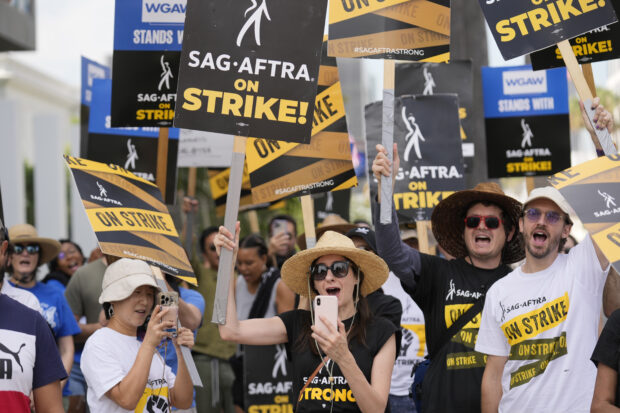Striking actors to resume negotiations with studios next week

Picketers carry signs on the picket line outside Netflix on Wednesday, Sept. 27, 2023, in Los Angeles. Hollywood’s writers strike was declared over Tuesday night when board members from their union approved a contract agreement with studios, bringing the industry at least partly back from a historic halt in production. The actors strike continues in their bid to get better pay and working conditions. (AP Photo/Chris Pizzello)
NEW YORK—With the Hollywood writers strike over, actors will now get a shot at cutting their own deal with studios and streaming services.
The Screen Actors Guild-American Federation of Television and Radio Artists announced Wednesday night that strike negotiations with studios would resume Monday, Oct. 2. The guild said several studio executives will attend, much as they did during marathon sessions last week that helped bring the nearly five-month writers strike to an end.
Monday is the same day that network late-night hosts will return to the air.
Bill Maher led the charge back to work by announcing early Wednesday that his HBO show “Real Time with Bill Maher” would be back on the air Friday. By mid-morning, the hosts of NBC’s “The Tonight Show Starring Jimmy Fallon” and “Late Night with Seth Meyers,” ABC’s “Jimmy Kimmel Live” and “The Late Show With Stephen Colbert” on CBS had announced they’d also return, all by Monday. “Last Week Tonight” with John Oliver was slated to return to the air Sunday.
Comedy Central’s “The Daily Show,” which had been using guest hosts when the strike hit, announced Wednesday that it would return Oct. 16 “with an all-star roster of guest hosts for the remainder of 2023.” The plans for “Saturday Night Live” were not immediately clear.
The strikes have had a “catastrophic” impact on late-night television viewing, according to the research firm Samba TV. Without Colbert, Fallon and Kimmel proving fresh, topical material, the broadcast networks have seen late-night viewership declines of between 40% and 50%, said Ashwin Navin, Samba TV co-founder. “It remains to be seen how late night will rebound to its previous relevance,” he said.
Fallon, Meyers, Kimmel, Colbert and Oliver spent the latter part of the strike teaming up for a popular podcast called “Strike Force Five”—named after their personal text chain and with all proceeds benefiting their out-of-work writers. On Instagram on Wednesday, they announced “their mission complete.”
On Tuesday night, board members from the writers union approved a contract agreement with studios, bringing the industry at least partly back from a historic halt in production that stretched nearly five months.
Maher had delayed returning to his talk show during the ongoing strike by writers and actors, a decision that followed similar pauses by “The Drew Barrymore Show,” “The Talk” and “The Jennifer Hudson Show.”
The three-year agreement with studios, producers and streaming services includes significant wins in the main areas writers had fought for—compensation, length of employment, size of staffs and control of artificial intelligence—matching or nearly equaling what they had sought at the outset of the strike.
The union had sought minimum increases in pay and future residual earnings from shows and will get a raise of between 3.5% and 5% in those areas—more than the studios had initially offered.
The guild also negotiated new residual payments based on the popularity of streaming shows, where writers will get bonuses for being a part of the most popular shows on Netflix, Max and other services, a proposal studios initially rejected. Many writers on picket lines had complained that they weren’t properly paid for helping create heavily watched properties.
On artificial intelligence, the writers got the regulation and control of the emerging technology they had sought. Under the contract, raw, AI-generated storylines will not be regarded as “literary material”—a term in their contracts for scripts and other story forms a screenwriter produces. This means they won’t be competing with computers for screen credits. Nor will AI-generated stories be considered “source” material, their contractual language for the novels, video games or other works that writers may adapt into scripts.
Writers have the right under the deal to use artificial intelligence in their process if the company they are working for agrees and other conditions are met. But companies cannot require a writer to use artificial intelligence.—With David Bauder
/ra